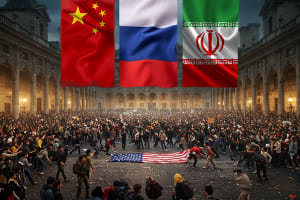Israel sets goal to achieve net zero emissions in 25 years

Israel's Ministry of Energy has drawn up a plan explaining how net zero might be achieved by the year 2050. The proposal was unveiled to the public on Thursday.
In 2021, then-Israeli Prime Minister Naftali Bennett told attendees at the UN Climate Change conference that “Israel is committing to cutting greenhouse gas emissions to net zero by 2050, and will phase out of the use of coal by 2025.”
The new comprehensive plan outlines how Israel might achieve that goal and involves radical recommendations for both public and private sectors. Changes to the way Israel produces energy, including infrastructure and the commercial and household use of energy, will be required. In addition, the plan is contingent upon using new technologies – some of which are still under development – and aims to minimize the use of Israel’s open spaces for energy production.
Three scenarios for achieving net zero emissions have been proposed, focusing on solar energy, blue hydrogen, and nuclear energy. The plan anticipates action being implemented now, with incremental steps toward reaching the goals set for 2050. Aiming to see significant progress during this decade, the plan anticipates economic savings of NIS 6 billion (more than $1.62 billion).
Former Environmental Protection Minister Tamar Zandberg reported that "in order to achieve the strategic goal of a zero-emissions and competitive economy, we must accelerate the transition from using polluting fuels to generating electricity from renewable, clean and economic energy."
"Our new execution plan shows that prioritizing the use and development of grid resources in favor of expanding the production and hoarding of solar-powered electricity while utilizing the growing built-up areas each year will enable 40% of electricity generation from renewable energy to be reached as early as this decade. This change of direction is both environmentally and health-wise and economically correct, and is expected to save billions of shekels for the economy and reduce electricity costs as early as this decade.”
The government has not previously proposed nuclear power as a concrete alternative energy source. It is hoped that regional cooperation towards achieving net zero could lead to the creation of an "energy bridge" in the Middle East.
The Energy Ministry hopes that building the infrastructure to import and export renewable energy will enable Israel to become a bridge between Europe, the Middle East, Asia, and Africa, encouraging investment and information-sharing that will contribute to regional stability.

Jo Elizabeth has a great interest in politics and cultural developments, studying Social Policy for her first degree and gaining a Masters in Jewish Philosophy from Haifa University, but she loves to write about the Bible and its primary subject, the God of Israel. As a writer, Jo spends her time between the UK and Jerusalem, Israel.
You might also like to read this:














